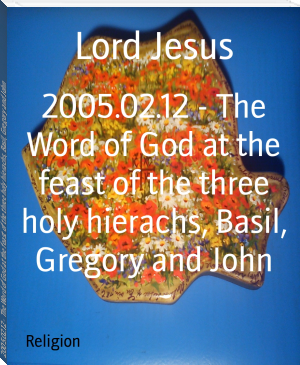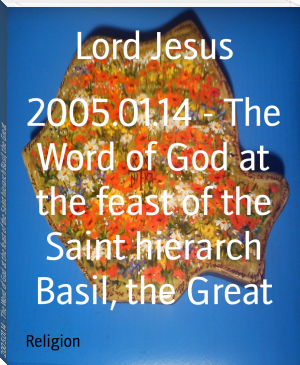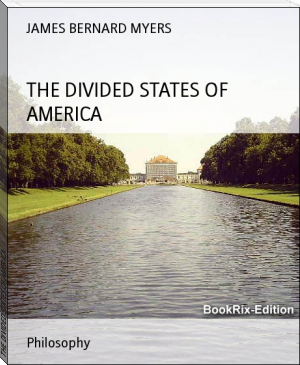The Book of Missionary Heroes by Basil Mathews (young adult books to read .txt) 📕

- Author: Basil Mathews
- Performer: -
Book online «The Book of Missionary Heroes by Basil Mathews (young adult books to read .txt) 📕». Author Basil Mathews
At last they broke in upon the rocky valleys of Afghanistan and came to the gateway of India—to Kabul. They presented themselves to Zeman Shah, the ruler of Afghanistan, and he was so taken with Abdallah's capacity that he asked him to be one of his officers in the court. So Abdallah stayed in Kabul. But the restless, fiery Sabat turned the face of his camel westward and rode back into Persia to the lovely city of Bokhara.
Abdallah the Daring
In Kabul there was an Armenian whose name we do not know: but he owned a book printed in Arabic, a book that Abdallah could read. The Armenian lent it to him. There were hardly any books in Arabic, so Abdallah took this book and read it eagerly. As he read, he thought that he had never in all his life heard of such wonderful things, and he could feel in his very bones that they were true. He read four short true stories in this book: they were what we call the Gospels according to Matthew, Mark, Luke and John. As he read, Abdallah saw in the stories Someone who was infinitely greater than Mohammed—One who was so strong and gentle that He was always helping children and women and people who were ill; so good that He always lived the very life that God willed; and so brave that He died rather than give in to evil men—our Lord Jesus Christ.
"I worship Him," said Abdallah in his heart. Then he did a very daring thing. He knew that if he turned Christian it would be the duty of Mohammedans to kill him. Why not keep quiet and say nothing about his change of heart? But he could not. He decided that he must come out in the open and confess the new Captain of his life. He was baptized a Christian.
The Moslems were furious. To save his life Abdallah fled on his camel westward to Bokhara. But the news that he had become a Christian flew even faster than he himself rode. As he went along the streets of Bokhara he saw his friend Sabat coming toward him. As a friend, Sabat desired to save Abdallah; but as a Moslem, the cruel law of Mohammed said that he must have him put to death. And Sabat was a fiery, hot-tempered Moslem.
"I had no pity," Sabat told his friends afterward. "I delivered him up to Morad Shah, the King."
So Abdallah was bound and carried before the Moslem judges. His friend Sabat stood by watching, just as Saul had stood watching them stone Stephen nearly eighteen centuries earlier.
"You shall be given your life and be set free," they said, "if you will spit upon the Cross and renounce Christ and say, 'There is no God but Allah.'"
"I refuse," said Abdallah.
A sword was brought forward and unsheathed. Abdallah's arm was stretched out: the sword was lifted—it flashed—and Abdallah's hand, cut clean off, fell on the ground, while the blood spurted from his arm.
"Your life will still be given you if you renounce Christ and proclaim Allah and Mohammed as His prophet."
This is how Sabat himself described what happened next. "Abdallah made no answer, but looked up steadfastly toward heaven, like Stephen, the first martyr, his eyes streaming with tears. He looked at me," said Sabat, "but it was with the countenance of forgiveness."
Abdallah's other arm was stretched out, again the sword flashed and fell. His other hand dropped to the ground. He stood there bleeding and handless. He bowed his head and his neck was bared to the sword. Again the blade flashed. He was beheaded, and Sabat—Sabat who had ridden a thousand miles with his friend and had faced with him the blistering sun of the desert and the snow-blizzard of the mountain—saw Abdallah's head lie there on the ground and the dead body carried away.
Abdallah had died because he was faithful to Jesus Christ and because Sabat had obeyed the law of Mohammed.
The Old Sabat and the New
The news spread through Bokhara like a forest fire. They could hardly believe that a man would die for the Christian faith like that. As Sabat told his friends afterward, "All Bokhara seemed to say, 'What new thing is this?'"
But Sabat was in agony of mind. Nothing that he could do would take away from his eyes the vision of his friend's face as Abdallah had looked at him when his hands were being cut off. He plunged out on to the camel tracks of Asia to try to forget. He wandered far and he wandered long, but he could not forget or find rest for his tortured mind.
At last he sailed away on the seas and landed on the coast of India at Madras. The British East India Company then ruled in India, and they gave Sabat a post in the civil courts as mufti, i.e. as an expounder of the law of Mohammed. He spent most of his time in a coast town north of Madras, called Vizagapatam.[59] A friend handed to him there a little book in his native language—Arabic. It was another translation of those stories that Abdallah had read in Kabul—it was the New Testament.[60]
Sabat sat reading this New Book. He then took up the book of Mohammed's law—the Koran—which it was his daily work to explain. He compared the two. "The truth came"—as he himself said—"like a flood of light." He too began to worship Jesus Christ, whose life he had read now for the first time in the New Testament. Sabat decided that he must follow in Abdallah's footsteps. He became a Christian.[61] He was then twenty-seven years of age.
The Brother's Dagger
In the world of the East news travels like magic by Arab dhow (sailing ship) and camel caravan. Very quickly the news was in Arabia that Sabat had renounced Mohammed and become a Christian. At once Sabat's brother rose, girded on his dagger, left the tents of his tribe, mounted his camel and coursed across Arabia to a port. There he took ship for Madras. Landing, he disguised himself as an Indian and went up to Vizagapatam to the house where his brother Sabat was living.
Sabat saw this Indian, as he appeared to be, standing before him. He suspected nothing. Suddenly the disguised brother put his hand within his robe, seized his dagger, and leaping at Sabat made a fierce blow at him. Sabat flung out his arm. He spoilt his brother's aim, but he was too late to save himself. He was wounded, but not killed. The brother threw off his disguise, and Sabat—remembering the forgiveness of Abdallah—forgave his brother, gave him many presents, and sent loving messages to his mother.
Sabat decided that he could no longer work as an expounder of Moslem law: he wanted to do work that would help to spread the Christian Faith. He went away north to Calcutta, and there he joined the great men who were working at the task of translating the Bible into different languages and printing them. This work pleased Sabat, for was it not through reading an Arabic New Testament that all his own life had been changed?
Because Sabat knew Persian as well as Arabic he was sent to help a very clever young chaplain from England named Henry Martyn, who was busily at work translating the New Testament into Persian and Arabic. So Sabat went up the Ganges to Cawnpore with Henry Martyn.
Sabat's fiery temper nearly drove Martyn wild. His was a flaming Arab spirit, hot-headed and impetuous; yet he would be ready to die for the man he cared for; proud and often ignorant, yet simple—as Martyn said, "an artless child of the desert."
Sabat's knowledge of Persian was not really so good as he himself thought it was, and some of the Indian translators at Calcutta criticised his translation. At this he got furiously angry, and, like St. Peter, the fiery, impetuous apostle, he denied Jesus Christ and spoke against Christianity.
With his heart burning with rage and his great voice thundering with anger, Sabat left his friends, went aboard ship and sailed down the Bay of Bengal by the Indo-Chinese coast till he came to Penang, where he began to live as a trader.
But by this time the fire of his anger had burnt itself out. He—again like Peter—remembered his denial of his Master, and when he saw in a Penang newspaper an article saying that the famous Sabat, who had become a Christian and then become a Mohammedan again, had come to live in their city, he wrote a letter which was published in the newspaper at Penang declaring that he was now—and for good and all—a Christian.
A British officer named Colonel MacInnes was stationed at Penang. Sabat went to him. "My mind is full of great sorrow," he said, "because I denied Jesus Christ. I have not had a moment's peace since Satan made me do that bad work. I did it for revenge. I only want to do one thing with my life: to spend it in undoing this evil that has come through my denial."
Sabat left the house of the Mohammedan with whom he was living in Penang. He found an old friend of his named Johannes, an Armenian Christian merchant, who had lived in Madras in the very days when Sabat first became a Christian. Every night Johannes the Armenian and Sabat the Arab got out their Bibles, and far into the night Sabat would explain their meaning to Johannes.
The Prince from Sumatra
One day all Penang was agog with excitement because a brown Prince from Acheen, a Malay State in the island of Sumatra, had suddenly sailed into the harbour. He was in flight from his own land, where rebels had attacked him. The people of Acheen were wild and ferocious; many of them were cannibals.
"I will join you in helping to recover your throne," said Sabat to the fugitive Prince. "I am going," said Sabat to Colonel MacInnes, "to see if I can carry the message of Christianity to this fierce people."
So Sabat and the Prince, with others, went aboard a sailing ship and crossed the Strait of Malacca to Sumatra. They landed, and for long the struggle with the rebels swayed from side to side. The Prince was so pleased with Sabat that he made him his Prime Minister. But the struggle dragged on and on; there seemed to be no hope of triumph. At last Sabat decided to go back to Penang. One day he left the Prince and started off, but soldiers of the rebel-chief Syfoolalim captured him.
Great was the joy of the rebels—their powerful enemy was in their hands! They bound him, threw him into a boat, hoisted him aboard a sailing ship and clapped him in the stifling darkness of the hold. As he lay there he pierced his arm to make it bleed, and, with the blood that came out, wrote on a piece of paper that was smuggled out and sent to Penang to Colonel MacInnes.
The agonies that Sabat suffered in the gloom and filth of that ship's hold no one will ever know. We can learn from the words that he wrote in the blood from his own body that they loaded worse horrors upon him because he was a Christian. All the scene is black, but out of the darkness comes a voice that makes us feel that Sabat was faithful at the end. In his last letter to Colonel MacInnes he told how he was now ready (like his friend Abdallah) to die for the sake of that Master whom he had in his rage denied.
Then one day his cruel gaolers came to the hold where he lay,





Comments (0)